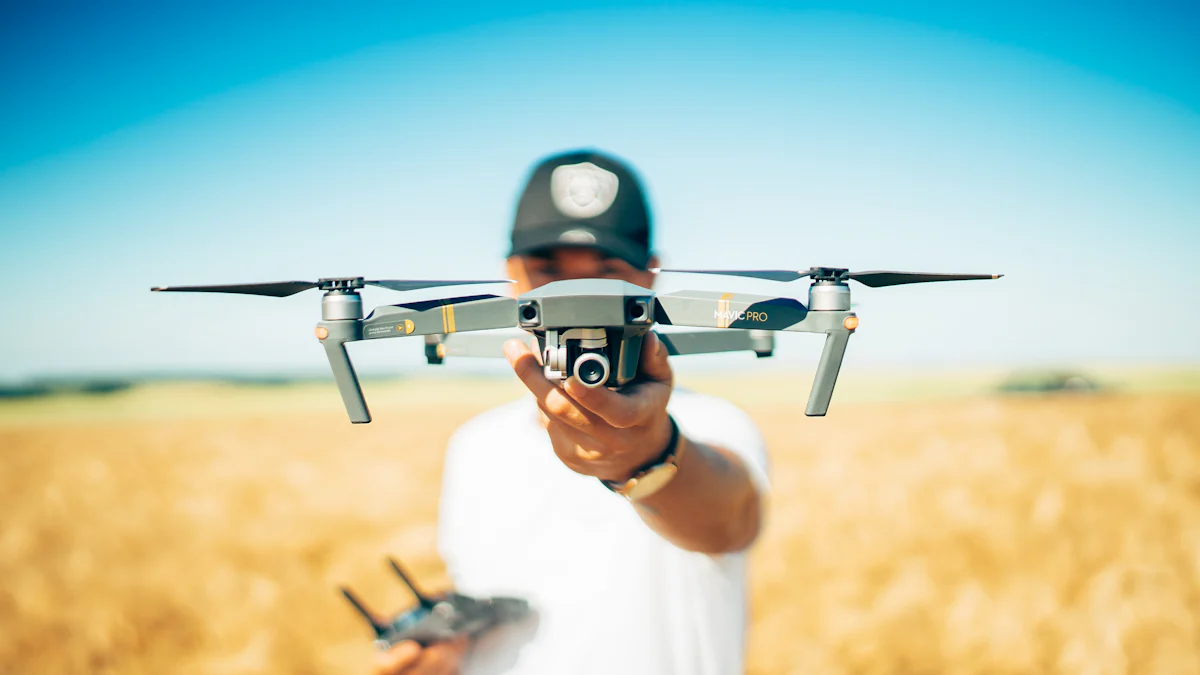How to Choose the Best Farming Thermal Camera for Drone with iSun Analog FPV Technology

Exploring the Basics of Farming Thermal Cameras
As technology continues to advance, the use of farming thermal cameras for drones has become increasingly prevalent in modern agriculture. In this section, we will delve into the fundamental aspects of farming thermal cameras and their significance in agricultural practices.
Understanding Thermal Imaging
Thermal imaging is a cutting-edge technology that enables the visualization of heat signatures emitted by objects and organisms. This is achieved through the detection of infrared radiation, which is invisible to the human eye. The captured data is then translated into visible images that represent variations in temperature.
What is Thermal Imaging?
Thermal imaging involves capturing infrared radiation emitted by objects and converting it into visible images. Unlike traditional cameras that rely on visible light, thermal cameras detect heat emissions, allowing for the visualization of temperature differentials across surfaces.
Why is it Important for Farming?
In the realm of agriculture, farming thermal cameras play a crucial role in assessing crop health, monitoring irrigation systems, and identifying areas of heat stress within fields. By detecting temperature variations, farmers can gain valuable insights into plant vitality and water distribution, enabling them to make informed decisions to optimize crop yield and quality.
Types of Thermal Cameras for Drones
When considering thermal cameras for agricultural applications, there are various types available, each with distinct features tailored to specific needs.
Fixed vs. Gimbal Cameras
Fixed thermal cameras are mounted directly onto drones and offer a stable viewing angle during flight. On the other hand, gimbal cameras provide enhanced flexibility by allowing users to adjust the camera's orientation mid-flight, providing a wider range of surveillance capabilities.
Resolution and Range Considerations
Resolution and range are critical factors when selecting a farming thermal camera for drone deployment. Higher resolution cameras offer finer detail in thermal imagery, while extended range capabilities enable broader coverage of agricultural landscapes.
The Significance of iSun Analog FPV Technology in Agriculture
In the realm of modern agriculture, the utilization of iSun analog FPV thermal cameras has revolutionized the way farmers monitor and manage their crops. This section will explore the distinctive features that set iSun analog FPV technology apart and showcase real-world applications through case studies.
What Makes iSun Analog FPV Stand Out?
Real-Time Imaging Benefits
The integration of iSun analog FPV thermal cameras offers unparalleled real-time imaging benefits for agricultural surveillance. By capturing and transmitting thermal data instantaneously, farmers can swiftly identify areas of concern such as heat stress in crops or malfunctioning irrigation systems. This immediate access to critical information enables prompt decision-making, leading to more effective interventions and improved crop outcomes.
Compatibility with Drones
One of the key advantages of iSun analog FPV technology is its seamless compatibility with drones, making it an ideal solution for aerial monitoring in agriculture. The lightweight design and streamlined integration process ensure that these thermal cameras can be effortlessly mounted onto drones, enabling efficient aerial surveys across vast farmlands. This compatibility empowers farmers to gain comprehensive insights into their fields without the limitations of ground-based assessments.
Case Studies: iSun Analog FPV in Action
Improved Crop Health Monitoring
Through the deployment of iSun analog FPV thermal cameras, farmers have witnessed significant enhancements in crop health monitoring. The high-resolution imagery provided by these cameras allows for precise identification of temperature differentials across fields, enabling early detection of potential issues such as water stress or pest infestations. This proactive approach to crop health management has resulted in improved overall plant vitality and resilience.
Enhanced Irrigation Management
The application of iSun analog FPV technology has proven instrumental in optimizing irrigation management practices. By leveraging thermal imaging capabilities, farmers can accurately assess the effectiveness of their irrigation systems and identify areas with irregular heat patterns indicative of inadequate water distribution. This targeted approach to irrigation management not only conserves resources but also ensures that crops receive optimal moisture levels for sustained growth.
How to Choose the Right Farming Thermal Camera for Your Drone
When selecting a farming thermal camera for drone, it is essential to consider key features that align with the specific needs of agricultural applications. Here are some crucial factors to evaluate when choosing the right thermal camera for your drone.
Key Features to Look For
Camera Resolution and Sensitivity
The resolution of a thermal camera determines the level of detail in captured images, making it a vital consideration for agricultural surveillance. Higher resolution cameras provide finer granularity, enabling farmers to discern subtle temperature variations across their fields with greater precision. Additionally, sensitivity to temperature differentials is paramount for detecting nuanced changes in plant health and irrigation patterns, ensuring that potential issues can be identified early on.
Weight and Battery Life
The weight of a thermal camera directly impacts the overall payload capacity and flight endurance of the drone. Opting for lightweight cameras is advantageous as it minimizes strain on the drone's propulsion system, allowing for extended flight times and broader coverage of farmlands. Moreover, assessing the battery life of thermal cameras is crucial, as prolonged operational durations are essential for comprehensive aerial surveys without frequent interruptions for recharging.
Evaluating iSun Analog FPV Thermal Cameras
Comparing Models and Prices
When considering iSun analog FPV thermal cameras, it is beneficial to compare available models based on their specifications and pricing. Each model may offer distinct features such as varying resolutions, range capabilities, and compatibility with different drone systems. By conducting a thorough comparison, farmers can identify the most suitable option that aligns with their budget constraints while fulfilling their imaging requirements.
Assessing User Reviews and Feedback
Gauging user reviews and feedback pertaining to iSun analog FPV thermal cameras provides valuable insights into real-world performance and reliability. Farmers can leverage experiences shared by other users to understand how these thermal cameras fare in agricultural settings, including aspects such as ease of integration with drones, image quality under varying environmental conditions, and overall satisfaction with the provided functionalities.
Putting It All Together: Tips for Successful Integration
As you prepare to integrate your iSun analog FPV thermal camera with your drone for agricultural surveillance, it's essential to consider the installation, setup, and best practices for optimal use.
Installation and Setup
Mounting Your Thermal Camera
When mounting your iSun analog FPV thermal camera onto your drone, ensure that it is securely affixed to withstand the rigors of aerial operations. Utilize mounting hardware that is compatible with both the camera and the drone model, providing a stable attachment that minimizes vibrations during flight. Additionally, consider the optimal positioning of the camera to capture comprehensive thermal data across agricultural landscapes without obstruction.
Configuring for Optimal Performance
Upon mounting the thermal camera, configuring it for optimal performance is paramount. Calibrate the camera settings to align with the specific environmental conditions of your farmland, adjusting parameters such as temperature range sensitivity and color palettes to enhance visibility of thermal differentials. Furthermore, ensure seamless integration with your drone's control system, enabling real-time transmission of thermal imagery for immediate analysis and decision-making.
Best Practices for Use
Regular Maintenance Tips
Sustaining peak performance of your iSun analog FPV thermal camera necessitates regular maintenance routines. Periodically inspect the camera housing and lens for any signs of damage or debris accumulation that may impede image clarity. Additionally, conduct firmware updates in accordance with manufacturer recommendations to leverage advancements in imaging algorithms and operational stability.
Maximizing the Benefits of Thermal Imaging
To maximize the benefits offered by your iSun analog FPV thermal camera, adopt proactive strategies that capitalize on its capabilities. Establish a systematic approach to analyzing captured thermal data, identifying recurring patterns or anomalies that warrant further investigation. Moreover, integrate thermal imaging into your crop management protocols by leveraging insights gained from temperature differentials to optimize irrigation schedules and implement targeted interventions for crop health.
Final Thoughts
As we look ahead to the future of agriculture, it's evident that thermal imaging technology will continue to play a pivotal role in shaping the industry. Emerging trends and technologies in thermal imaging are poised to further revolutionize agricultural practices, offering new avenues for precision monitoring and management.
Emerging Trends and Technologies
The evolution of thermal imaging is marked by advancements in sensor capabilities, image processing algorithms, and integration with artificial intelligence. These developments are driving the refinement of thermal cameras, enhancing their ability to capture intricate details of temperature differentials across agricultural landscapes. Moreover, the integration of multispectral imaging alongside thermal data holds promise for comprehensive insights into crop health and environmental conditions.
In addition to technological advancements, the widespread adoption of iSun analog FPV thermal cameras is set to transform farming practices. The seamless compatibility with drones and real-time imaging benefits offered by iSun analog FPV technology empower farmers with unparalleled capabilities for aerial surveillance. This integration facilitates proactive decision-making based on immediate thermal data, leading to more efficient resource allocation and targeted interventions.
Personal Reflections on the Impact of iSun Analog FPV
From a personal standpoint, witnessing the impact of iSun analog FPV thermal cameras on agricultural operations has been truly remarkable. The ability to capture real-time thermal imagery from aerial vantage points has redefined how farmers approach crop monitoring and management. The insights gained from thermal data have empowered farmers to implement precise interventions that optimize crop health and maximize yields. As we reflect on the impact of iSun analog FPV technology, it's clear that its integration with drones has ushered in a new era of precision agriculture, setting a promising trajectory for sustainable farming practices.
See Also
Selecting the Top Drone Thermal Imaging Camera for FPV: iSun Analog FPV Camera Handbook
Picking the Finest Thermal Camera for Drone with FPV Tech
Selecting the Optimal Analog FPV Thermal Camera for Drones with Thermal Tech
Selecting the Ultimate FPV Thermal Camera for Drone Surveillance and Imaging
Contact Us: Ms. Coco Huang
E-mail: sales@iasun.cn
WhatsApp/Wechat: +86 13510421923

